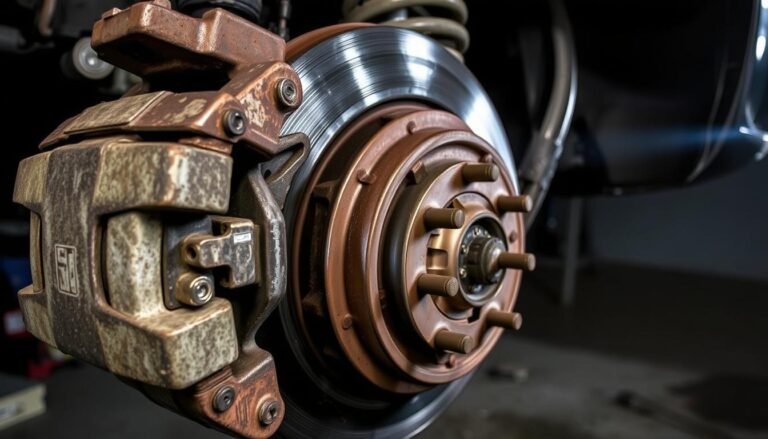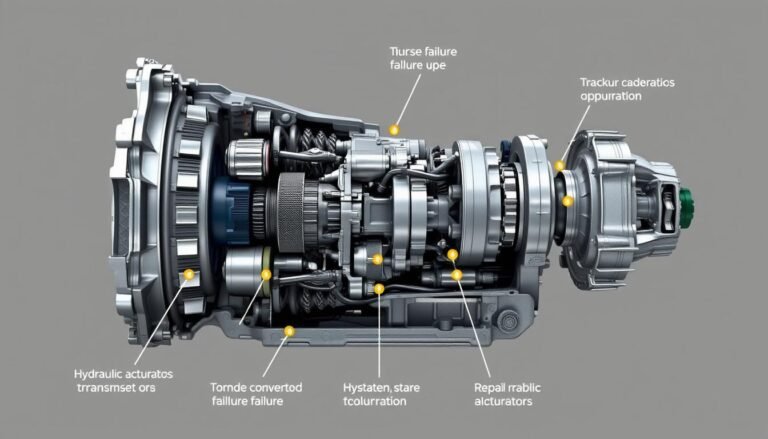What Kind of Oil Does A Honda Crv Take? Best Oil Type Guide Choices & Specs
What oil is best for a Honda CRV? What kind of oil does a honda crv take? The suggested oil type ranges from 0W-20 fully synthetic to 5W-20 depending on the car’s engine and year.
It’s crucial to choose the right oil to keep your Honda CRV’s engine running well and lasting long.
This guide will help you find the best oil based on your car’s engine, how you drive, and the oils on the market.
Starting with the right oil helps protect your engine, save on gas, and extend its life. We will look at fully synthetic, conventional, and semi-synthetic oils for you.
It’s important to know your Honda CRV’s needs, which might change based on the weather, how you drive, and how old the engine is.
We’ll also give you tips on understanding viscosity ratings and when to change your oil.
Are you ready to learn more? Let’s give you the knowledge you need to keep your Honda CRV in top shape.
Keep reading to find out all you need to know about choosing and changing your car’s oil!
What Is Honda CRV Engine Types?
It’s important to know the different Honda CRV engine types for your car’s care. The Honda CRV has changed a lot, with engines made for all kinds of drivers.
Firstly, older models came with a 2.4L inline-4 (I4) engine, but the newer ones have a turbocharged 1.5L I4.
Make sure to look at your owner’s manual. It has all you need to know about each engine type.
Knowing this helps you give your Honda CRV the best care and improve its performance.
What Kind of Oil Does A Honda CRV Take?
Every Honda CRV needs the best engine oil to run well. Fully synthetic oil is recommended for new models.
This oil offers the best protection and keeps the engine running efficiently. But, older CRVs can use different kinds of oils. These include conventional and blended oils.
Knowing the honda crv oil specification is key to choosing the right oil. The manufacturer suggests a certain viscosity rating.
Look at your owner’s manual to get the exact details. Using the honda crv recommended oil makes your engine last longer and run better.
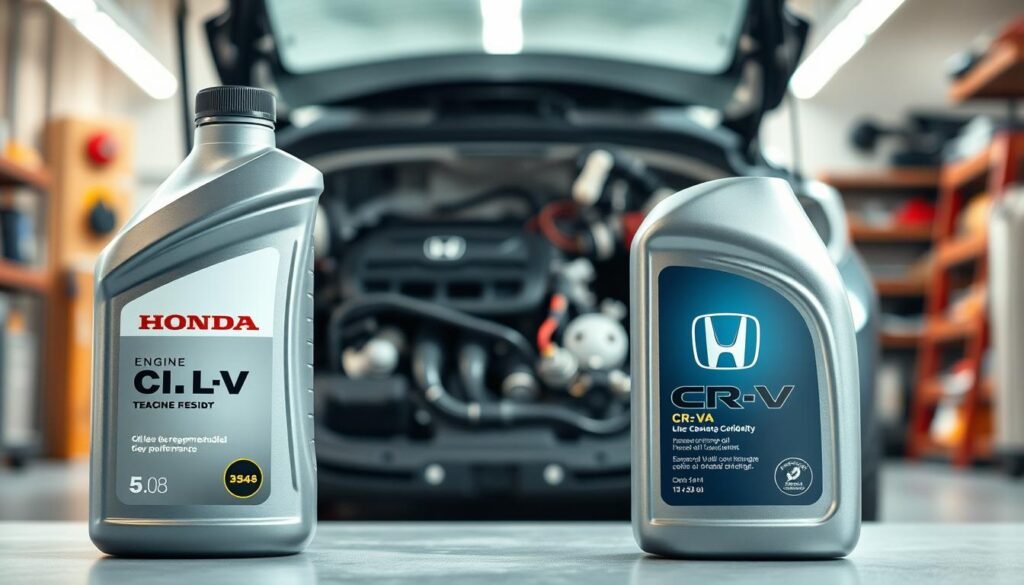
Think about your driving habits, the climate, and how old your car is when picking oil.
Following these guidelines will help your CRV last longer. It ensures it performs well on every drive.
Honda CRV Oil Specifications
Knowing the right Honda CRV oil requirements is key for your engine’s best performance. Most models need oil that is either 0W-20 or 5W-20.
This helps your engine run smoothly in different weather. These oil types match the Honda CRV oil standards made by the car builders.
They protect your engine and make it last longer. You should always look at your car’s owner manual for the exact oil type.
Following these rules is important for keeping your engine in good shape. It also helps your car use less gas and pollute less.
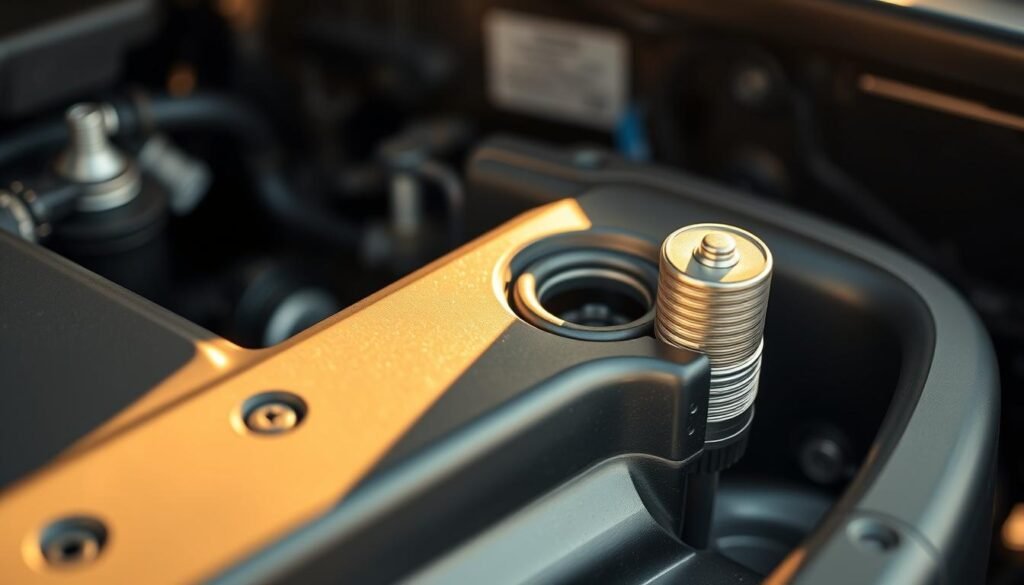
| Model Year | Recommended Viscosity | Performance Standards |
|---|---|---|
| 2007-2011 | 0W-20 | API SN, ILSAC GF-5 |
| 2012-2016 | 0W-20 | API SN, ILSAC GF-5 |
| 2017-Present | 0W-20 | API SN, ILSAC GF-5 |
Following these oil specs is key for your Honda CRV’s best performance. Remember this info when it’s time for an oil change.
Best Oil Types For Honda CRV
Finding the right oil for your Honda CRV is key to keeping it running well. There are many oil types to choose from, each serving different needs. Knowing about these will help you pick the best oil for your vehicle.
Fully Synthetic Oil
Synthetic oil for the Honda CRV protects against engine wear and stops sludge build-up. It handles extreme temperatures well and gives you better gas mileage than regular oils.
Fully synthetic oil is best for new or high-performance CRVs because of its top-notch performance. Though more expensive, it cuts down on maintenance costs in the long run.
Conventional Oil
For older CRVs or those used to regular oils, conventional oil is suggested. It’s a budget-friendly choice for everyday care when advanced protection isn’t needed.
You’ll need to change oil regularly to keep your engine in good shape.
Semi-Synthetic Oil
Semi-synthetic oil is a mix of conventional and synthetic. It offers better protection at a lower price than pure synthetics.
It’s great if you want synthetic benefits without paying a lot. This oil is perfect for drivers who face different driving situations.
| Oil Type | Benefits | Best For | Price Range |
|---|---|---|---|
| Fully Synthetic Oil | Superior protection, high performance, better fuel efficiency | Newer models, high-performance needs | $$$ |
| Conventional Oil | Cost-effective, sufficient lubrication | Older models, routine maintenance | $ |
| Semi-Synthetic Oil | Balanced protection, versatile, affordable | Drivers wanting hybrid benefits | $$ |
Honda CRV Oil Viscosity
Learning the importance of oil viscosity is key to maintaining your Honda CRV.
Viscosity ratings for Honda CRV indicate how effectively oil flows and lubricates the engine under various temperature conditions.
Choosing the correct oil viscosity ensures optimal protection and performance for your vehicle.
Importance of Viscosity Ratings
Viscosity ratings play a crucial role in engine lubrication. These ratings determine how well the oil flows at different temperatures, impacting engine startup and overall performance.
For Honda CRV owners, selecting oil with the appropriate viscosity rating is essential for preventing engine wear and ensuring efficient operation, especially during cold starts.
Recommended Viscosity Grades
The recommended viscosity grades for Honda CRV typically include 0W-20 or 5W-20.
These grades provide excellent fuel efficiency and protection across a broad temperature range.
Using the correct honda crv oil viscosity enhances lubrication, ensuring that engine components receive adequate oil flow to maintain performance and longevity.

Honda CRV Synthetic Oil vs. Conventional Oil
Choosing the right oil for your Honda CRV is vital for the best performance and long life.
Synthetic and conventional oils differ a lot in how they perform, their cost, and how often they need changing.
Synthetic oil, thanks to its high-tech formula, has many benefits. It’s stronger against breaking down, which means fewer oil changes and saved money over time.
Conventional oil, while less expensive, could work for older Honda CRV models. However, it doesn’t last as long, especially in tough conditions. This might mean you’ll need to change oil more often.
| Feature | Synthetic Oil | Conventional Oil |
|---|---|---|
| Cost | Higher upfront cost | Lower upfront cost |
| Engine Protection | Superior protection at extreme temperatures | Basic protection for older engines |
| Oil Change Interval | Longer intervals (up to 10,000 miles) | Shorter intervals (3,000 to 5,000 miles) |
| Fuel Efficiency | Can enhance fuel economy | No significant effect on fuel economy |
| Environmental Impact | Less waste due to fewer oil changes | More waste from more frequent changes |
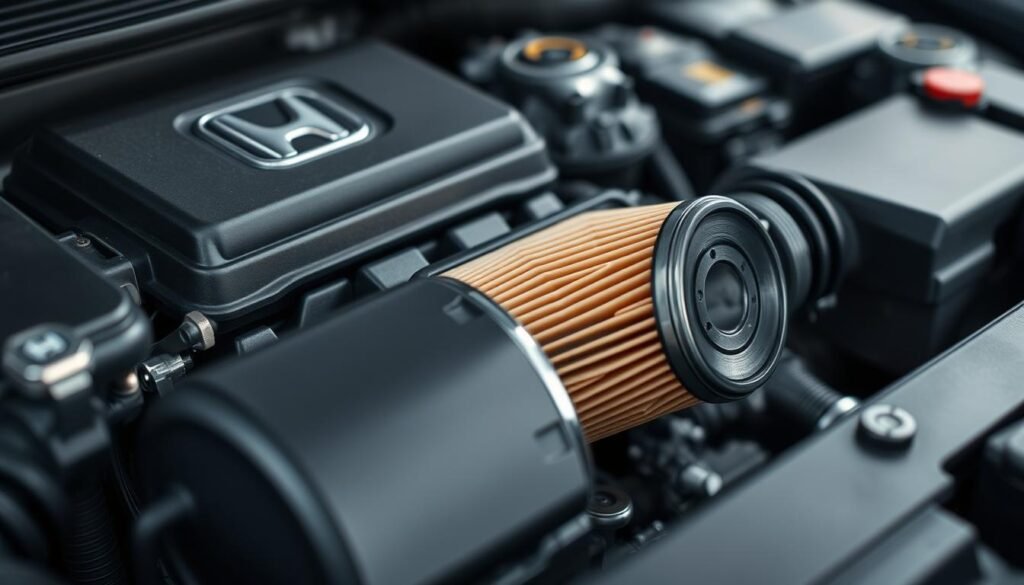
Factors To Consider When Choosing Honda CRV Oil?
When you’re picking oil for your Honda CRV, a few things matter a lot. These factors help decide which oil works best in your engine.
Knowing what affects your choice can protect your engine and keep it running smoothly.
Driving Conditions and Climate
The weather where you live and how you drive play a big role in choosing your oil. For places with very hot or cold weather, synthetic oils are usually a better choice.
They protect your engine more. And if you often drive in heavy traffic or carry big loads, you need oil that can handle the extra stress. This keeps your engine lasting longer.
Engine Age and Wear
The age and state of your engine matter when selecting oil. Older engines get along better with conventional oils or mixes that stop leaks and keep things running well.
For engines that have been around the block a few times, you want oil with special additives. These help prevent more wear and make your engine run more smoothly.
Oil Change Frequency
How often you change your honda crv oil is key to keeping your engine healthy. Changing your oil more often means you can choose less pricey oils.
But if you wait longer between changes, it’s smarter to go with a high-quality synthetic oil. This ensures your engine always works its best.
| Factor | Impact on Oil Choice |
|---|---|
| Climate | Extreme temperatures favor synthetic oils for improved protection. |
| Driving Conditions | Stop-and-go driving requires oils suited for high-stress scenarios. |
| Engine Age | Older engines may require conventional oils or blends to prevent leaks. |
| Oil Change Frequency | Frequent changes allow for more flexible oil options. |
How To Change Oil in A Honda CRV?
Changing your Honda CRV’s oil is crucial for keeping the engine smooth. It ensures your car performs well and lasts longer. Start by getting your tools and oil ready.
Step-by-Step Oil Change Process
- Park your Honda CRV on a flat spot and turn the engine off. Wait a bit for the engine to cool.
- Collect the needed tools: an oil filter wrench, a socket set, a drain pan, and the correct oil.
- Find the oil drain plug under the car. Put the drain pan below it.
- Use your socket set to take out the drain plug. Let all the old oil drain out into the pan.
- After it’s all drained, put the drain plug back and tighten it well.
- With the oil filter wrench, take off the old oil filter. Make sure the rubber O-ring is also removed.
- Put in a new oil filter, making sure it’s sealed right as the manufacturer suggests.
- Add new oil via the oil cap on top, using a funnel. Check your car’s manual to know how much and which oil to use.
- Check the oil level with the dipstick, add more oil if you need to.
- Turn your engine on and let it run a bit. Look for any leaks near the oil filter and drain plug.
Required Tools and Supplies
| Tool/Supply | Purpose |
|---|---|
| Oil Filter Wrench | To remove and install the oil filter. |
| Socket Set | To remove the drain plug. |
| Drain Pan | To hold the old oil when changing. |
| New Oil | For refilling the engine after old oil is removed. |
| Funnel | Helps avoid spills when adding new oil. |
Common Myths About Honda CRV Oil
It’s important to know the truth about Honda CRV oil to keep your car running well. A big myth is thinking any motor oil will work in your CRV.
The truth is, different engines need specific oils to run right. If you use the wrong type, it could hurt your engine.
Some believe if the oil looks clean, you don’t need to change it soon. That’s not true. Oil can get old and stop protecting your engine, even if it looks okay.
It’s best to change your oil regularly, following the schedule for your car. Also, don’t think that synthetic oil is only for fancy cars.
Many Honda CRVs do better with synthetic oil. It protects the engine better over time. Using the right oil makes your engine last longer and run better.
Here’s a quick look at some oil myths and the facts:
| Myth | Fact |
|---|---|
| All oils are the same | Specific engines require specific oil types to function correctly. |
| If it looks clean, it’s fine | Oil can degrade without discoloration; follow the recommended change intervals. |
| Synthetic oil is not necessary for non-luxury cars | Synthetic oil can improve performance in many standard engines, including Honda CRVs. |
Conclusion
Choosing the right oil for your Honda CRV is key. It affects how well and how long your car runs.
Knowing about the different oils helps you pick wisely, which boosts your car’s performance. It’s very important to keep up with oil changes.
Using the right oil and changing it when you should keeps your car working its best. Also, things like how you drive and how old your car is matter when picking your oil.
So, staying up-to-date with your car’s needs is crucial for good maintenance. Learning about what oil your car needs is a smart move.
It means your car will keep running smoothly for a long time. By making informed choices, you ensure your driving experience is both dependable and enjoyable.
FAQs
Q: What type of oil does a Honda CRV require?
A: Most Honda CRV models need top-quality fully synthetic oil or a mix of regular oil. The right thickness is often 0W-20 or 5W-20, based on the engine.
Q: How often should I change the oil in my Honda CRV?
A: You should change the oil every 5,000 to 7,500 miles. Or follow what your owner’s manual says. You might need to do it more often if you drive a lot under tough conditions.
Q: Can I use conventional oil in my Honda CRV?
A: Older models can use conventional oil, but full synthetic oil is best for newer engines. It helps them run better and last longer.
Q: What are the benefits of using synthetic oil in my Honda CRV?
A: Synthetic oil protects your engine better, reduces wear, improves fuel economy, and works better in extreme cold or heat. It’s better than conventional oils.
Q: Is it okay to mix different types of oil in my Honda CRV?
A: Mixing different oils is not a good idea. It can make your engine perform worse and reduce protection. Always use what the manufacturer recommends.
Q: How do I check the oil level in my Honda CRV?
A: To check the oil, park on a flat surface and turn off the engine. Wait a bit, then pull out the dipstick, clean it, put it back, and pull it out again to see the level.
Q: What are the advantages of semi-synthetic oil for my Honda CRV?
A: Semi-synthetic oil is a good middle ground. It offers better protection than regular oil and is cheaper than fully synthetic oil.


